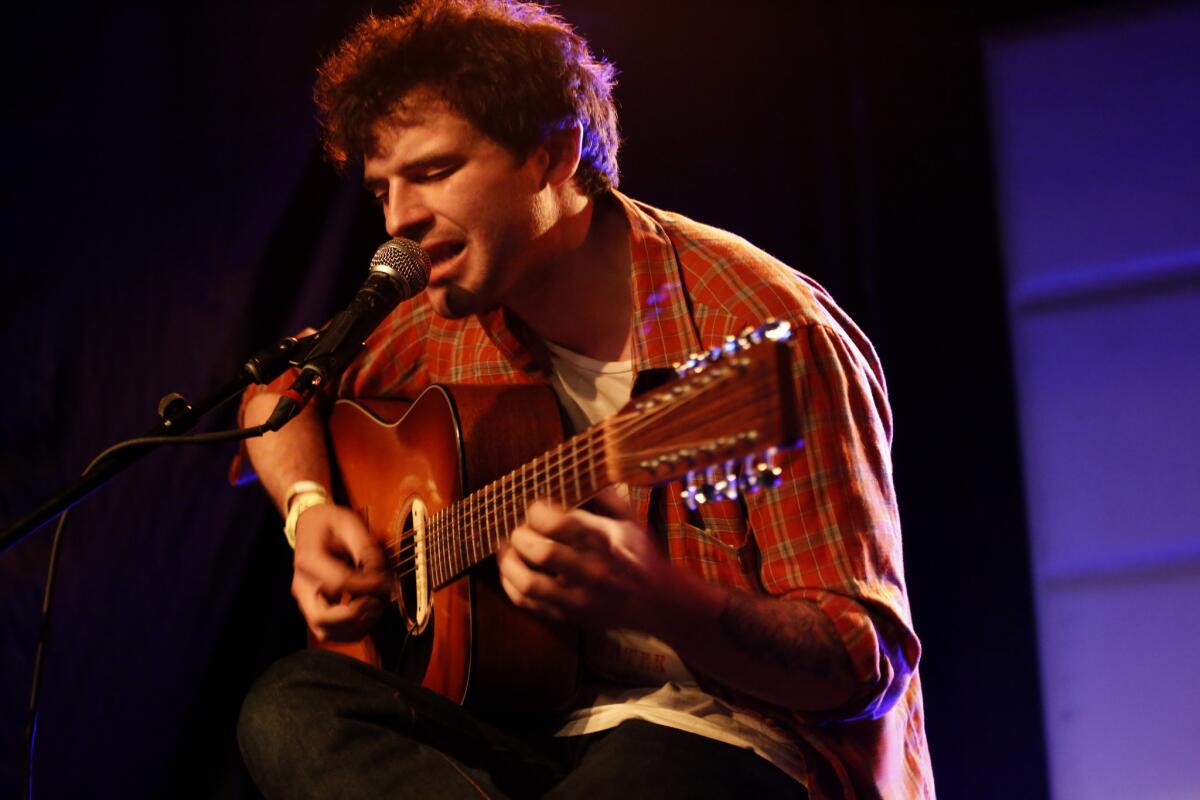Review: Ryley Walker explores a pastoral past with mesmerizing folk set at the Echo

Ryley Walker, a folk-rock singer from Chicago, performed a mesmerizing set of guitar music at the Echo on Tuesday night.
The folk guitarist Ryley Walker sat alone on a stool, legs crossed, a sound system well-balanced at the edge of feedback and a spotlight directed on him, tuning his 12-string acoustic. And tuning it. And tuning it.
“It’s all part of the act,” he joked while tweaking tones across the dozen strings for a few minutes, ringing each note until, with an angel-heralding strum, they hummed in sweet harmony.
It was necessary that he hone the machine. Throughout his set Tuesday night at the Echo, the Chicago artist, touring in support of his new album, “Primrose Green,” precisely maneuvered his fingers to strike notes with an undistorted clarity. To hit a mid-song bum note would have been like puncturing a tire while accelerating into a hard speedway turn. Who knows what carnage could have ensued?
Luckily, no bones were broken across an hour-long set that showcased Walker’s deft hands and solo guitar illuminations. A few minds were blown, though, especially during “Griffith’s Buck’s Blues,” a work that weaved an Irish-accented melody through a stream of start-and-stop chords. Across that and other pastoral originals and a choice take on Van Morrison’s “Fair Play,” Walker created music with rolling momentum, one that required he maneuver through rhythmic patterns.
Fed through a pick-up, this guitar work was steeped in the 1960s folk guitar movement and the stylistic offshoots that arrived after. Celebrating both instrumental prowess and pastoral simplicity, Walker drew on the ideas of artists including John Fahey, Joni Mitchell, John Martyn and inheritors such as Glenn Jones and James Blackshaw. Despite the obvious debts, though, he’s developed his own ideas.
On the studio versions of “Primrose” songs, Walker recorded with a band of miraculously practiced Chicago jazz players. At the Echo, the handsome, once shaggy-headed troubadour had a clean haircut that made him look downright respectable, and his presentation was equally crisp. He required only two acoustic guitars and a microphone. One was that 12-string, the other a six-string, and any doubt that Walker was relying on the extra strings to add heft was abundantly clear on his self-penned title track.
Lyrically, the song’s a mantra that evokes more than it explains, hinting at some mysterious place just beyond the horizon. Neither it nor any of his lyrics read well on the page. It’s all in the delivery, one strongly influenced by the work of the late Los Angeles avant-folk singer Tim Buckley and his son, Jeff Buckley. Walker has an equally elastic, if less gymnastic, voice, one that he moves through octaves, yowling and bellowing with emotion, carrying syllables across the bars like birds flying across stone walls.
For Morrison’s “Fair Play,” the first track on the 1974 album “Veedon Fleece,” Walker turned a piano-based jazz ballad into a six-stringed workout that replaced keyboard percussiveness with dazzling fretboard runs. “Tell me of Poe, Oscar Wilde and Thoreau,” sang Walker. “Let your midnight and your daytime turn into love of life.”
Before Walker’s set (and after an assured opening performance by singer-songwriter Matt Kivel), the Los Angeles artist Pearl Charles unveiled a new band with a striking set of originals. Drawing on classic country, Byrds-style electrified folk rock and Brill Building song craft, Charles exuded a magnetic confidence while updating vintage styles with contemporary urgency. She focused on songs from her upcoming EP, which will arrive via Burger Records in July.
Far removed from the bucolic landscape later offered by Walker, Charles and her band rocked through cosmopolitan sounds that offered a different kind of escape.
Follow Randall Roberts on Twitter: @liledit
More to Read
The biggest entertainment stories
Get our big stories about Hollywood, film, television, music, arts, culture and more right in your inbox as soon as they publish.
You may occasionally receive promotional content from the Los Angeles Times.










